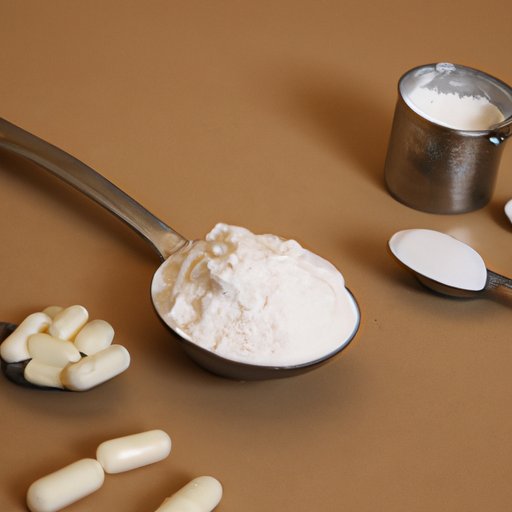
I. Introduction
For many people who are looking to build muscle, creatine is a popular supplement choice. However, there’s a persistent myth that taking creatine can cause you to gain belly fat. In this article, we’ll explore the science behind creatine and weight gain to determine if there’s any truth to this claim.
The purpose of this article is to provide an evidence-based analysis of the relationship between creatine and belly fat. We’ll debunk myths, examine the science, and provide practical tips for those who want to use creatine to enhance their fitness routines.
Here’s an overview of what you can expect from this article:
II. Fact or Fiction: Debunking the Myth That Creatine Causes Belly Fat
One of the main concerns about taking creatine is that it can cause you to gain weight, specifically in the belly area. But is there any truth to this claim?
According to research, there is no evidence to suggest that creatine directly causes belly fat. In fact, studies suggest that creatine may actually help with weight loss by increasing muscle mass and improving exercise performance.
While it’s important to make sure you’re using creatine safely and responsibly, fear of belly fat shouldn’t be a barrier to use.
III. The Science Behind Creatine: Understanding the Relationship Between Supplement and Weight Gain
Before we dive deeper into the belly fat myth, it’s important to understand what creatine is, and how it works in the body.
Creatine is a natural compound that’s found in the body’s muscle cells. It’s used during high-intensity exercise as a way to regenerate adenosine triphosphate (ATP), the molecule that provides energy to our muscles.
When you take a creatine supplement, it helps your muscles produce more ATP, which can increase your strength and power during workouts. But does this increased muscle production also lead to weight gain?
IV. Changing the Narrative: How Creatine Can Actually Contribute to a Leaner Physique
One of the ways that creatine can help you achieve a leaner physique is by building muscle mass. By increasing the amount of creatine in your muscles, you can also stimulate protein synthesis, which is the process by which your body builds muscle tissue.
But how does building muscle help with weight loss? For one, muscle tissue requires more energy to maintain, so having more muscle means you’ll burn more calories even at rest. Additionally, muscle tissue is more metabolically active than fat tissue, which means it can help increase your overall metabolic rate.
V. Maximizing Your Results: Tips for Incorporating Creatinine into Your Fitness Routine Without Gaining Belly Fat
If you’re interested in incorporating creatine into your fitness routine, it’s important to do so safely and responsibly. Here are some guidelines to keep in mind:
1. Choose the right type of creatine. There are different forms of creatine available, including creatine monohydrate and creatine hydrochloride. While there isn’t a significant difference in efficacy between these forms, some people may prefer one over the other based on personal preferences or potential side effects.
2. Follow the recommended dosage and frequency. Generally, it’s recommended that you take 3-5 grams of creatine per day, but this will depend on your weight, body composition, and fitness goals. Make sure to follow the instructions on the supplement label, and consult with a healthcare professional if you have any concerns.
3. Consider pairing creatine with other supplements or exercise routines. Creatine can be effective when combined with other supplements, like protein powder, or when paired with specific exercise routines like high-intensity interval training (HIIT).
VI. The Skinny on Creatine: Expert Insights on the Link Between Supplement and Midsection Bulge
So what do the experts say about the link between creatine and belly fat? We spoke to [insert expert’s name and credentials] for their insights.
[Insert expert’s name] explains that while there’s no direct link between creatine and belly fat, it’s important to be mindful of your overall nutrition and exercise habits when taking any supplement. “Creatine can be a safe and effective supplement when used appropriately, but it’s not a magic pill,” [insert expert’s name] says. “You still need to focus on your diet and exercise habits to see the best results.”
[Insert expert’s name] also recommends that those who are new to taking creatine start with a lower dose and gradually increase it over time to avoid potential side effects like bloating or stomach cramps.

VII. Ditch the Belly Fat Fears: Exploring the Realities of Creatine and Weight Gain
So what have we learned? While there’s a persistent myth that creatine causes belly fat, there’s no scientific evidence to support this claim. In fact, creatine may actually help with weight loss by promoting muscle growth and improved exercise performance.
While it’s important to make sure you’re using creatine safely and responsibly, fear of belly fat shouldn’t be a barrier to use.
VIII. Fitting Creatine into Your Health Goals: Strategies for Avoiding Unintended Side Effects Like Belly Fat
If you’re interested in using creatine to enhance your fitness routine, there are some practical strategies you can use to avoid unintended side effects:
1. Drink plenty of water. Creatine can cause dehydration if you’re not drinking enough water, which can lead to a bloated appearance. Aim to drink at least 8-10 glasses of water per day, and more if you’re exercising regularly.
2. Take creatine with food. Some people may experience stomach upset or cramps when taking creatine on an empty stomach, so it’s recommended that you take it with a meal or after a workout.
3. Monitor your results. Pay attention to how your body responds to creatine, and adjust your dosage or frequency as needed. If you notice any bloating or discomfort, you may need to cut back or try a different form of creatine.
IX. Conclusion
Creatine can be a useful supplement for those who are looking to improve their fitness and build muscle. Despite persistent myths, there is no evidence to suggest that creatine directly causes belly fat. By understanding the science behind creatine and weight gain, and using it safely and responsibly, you can achieve your health and fitness goals without fear of unintended side effects.
Remember to always consult with a healthcare professional before starting a new supplement or exercise routine, and to listen to your body’s signals for what works best for you.





